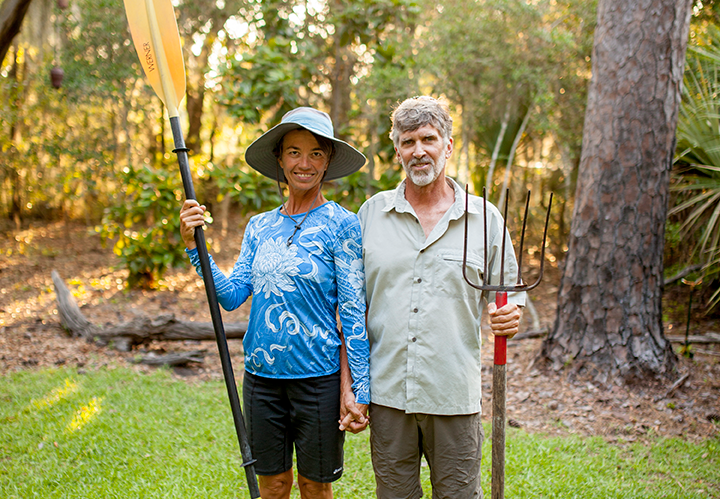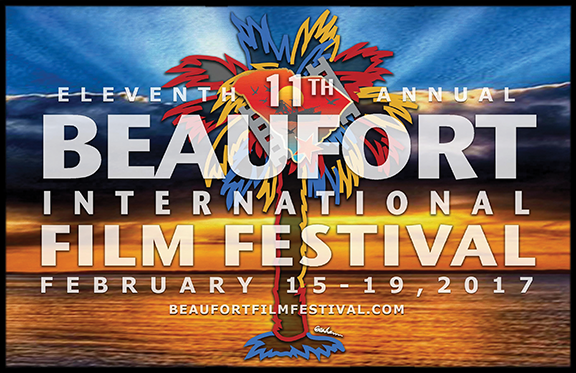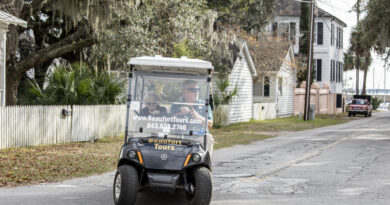Paddle and Pitchfork: Beaufort Gothic
story by mary ellen thompson
photography by john wollwerth
The world is filled with people who have good intentions, which for many of us, include lofty ideals of things yet to be accomplished. Kim Gundler and David Gorzynski live their intentions in the fullest way every day; foremost in a passive solar green house, much of which they built themselves. Kim took classes in construction management at the Technical College of the Lowcountry so she could act as their general contractor.
Kim explains, “We want to leave as small a carbon footprint as possible.” To that end, they have one car, one computer, one cell phone and travel by bike to do as many errands in town as they can. David was a commercial organic gardener in Columbia. In 1995, he had the first community supported agriculture farm in South Carolina. Now, the main source of their food is grown in his organic garden in their side yard. Kim says, “We work on Saturdays so there is no time to go to the farmers market; we are vegetarian and very active, so we eat a lot.” Apparently the garden isn’t limited to just people food; a gray cat strolled onto the porch and wound his way around the furniture to where another cat was peacefully sleeping on an ottoman. Kim looks at them and laughs, “They just don’t understand that they have to let the catnip grow before they eat it!”
The carbon footprint Kim and David leave may be small, but due to their stewardship of the area, the impact they have on the community of Beaufort is anything but small. Both certified master naturalists and city of Beaufort history guides, their knowledge of the history, culture and geography as well as all things animal, vegetable and mineral, is extensive. Their business takes people on guided kayak tours in the ACE Basin, Hunting Island and downtown Beaufort. “We make a difference by sharing the local natural and cultural history,” David explains. Kim smiles, “We are great cheerleaders of this area!”
Believing that community involvement is important, Kim serves on the board of the Spanish Moss Trail and the steering committee of Greendrinks.
Kim and David met at the Riverbanks Zoo in Columbia where they were both employed after college. David was a mammal keeper and Kim started out in the commissary making food for the animals. From their start at the zoo, their careers blossomed in different directions. Kim migrated to taking care of birds at the zoo then went into education; she has worked in museums and environmental organizations. Kim’s enchantment with the kayak began when she took a job with Department of Health and Environmental Control and was working with the Adopt-a-Stream program, checking on local bodies of water. She bought a kayak so she could have a closer look.
Since they shared a love of the water, it seems like kismet that Kim and David’s first date was in a canoe on the Congaree River. They had set their sights on Beaufort long before they were able to settle in. Kim tells the story: “David grew up in Beaufort and I had done some work here as a loggerhead sea turtle conservationist and had a deep love for the area, so when I met David the fact that he was from Beaufort definitely gave him points! After David moved to Columbia to finish his four-year degree in philosophy, and we met, we spent the next ten years working there because that is where the jobs were. We could not figure out how to make a living in Beaufort at that time, but had in mind we would get back here somehow. At the end of our stay in Columbia we moved onto a sailboat that we bought in Beaufort and then had it hauled up to Columbia and lived aboard on Lake Murray for a year renovating her, then had her shipped back down to Charleston and did some sailing. After a few months, we sailed back into Beaufort, up the Beaufort river from the ocean at dawn; it was one of the most beautiful things we’ve ever seen, and we knew we were home.”
“When David and I first got serious, I remember one thing that he said to me, ‘There are two ways to have enough – one is to make more and one is to want less.’ I knew then that he would set the stage for an interesting life. We have always tried to pursue our passions; making lots of money has never been one of them. I have always been in the environmental education field, no matter what it paid. David has done many things including organic gardening and sailmaking. There were times that the belt was pulled tight, but we always felt we had the freedom to pursue our interests.”
David is quick to point out “We’re soul mates.” Kim responds, “I trust him. I wouldn’t want to guide with anyone else. When we get out on the water and turn on our radios to communicate with each other, I know what he is going to say before he says it.” David agrees, “We read each other’s mind.” This is what makes a great team, a great friendship and marriage. It also makes a sturdy business relationship and when you’re guiding people out on open water, that’s essential.
“Lifestyle entrepreneurs” is how David describes their life/career choice, meaning “do for your living what it is you like to do.” So even when not being used for tours, the kayaks are never far away. Kim and David make a point of taking a few days each month to go on a road trip; one of which entailed kayaking from Beaufort to Charleston. Kim recalls, “We put in at Lucy Creek, when we crossed the Saint Helena Sound the surface was glassy and we saw about thirty loggerhead turtles. It took us three days of peace and quiet on the water, and camping on small islands along the way, to get there and then it was chaos because there are so many boats in Charleston!” Love of exploration on the water has taken them to Maine, Baja, the Florida Keys, the Bahamas, Alaska and British Columbia.
Even though Kim and David love the monthly explorations, Kim is the true adventurer. “Every year I take an extended international trip with a group. I travel in order to broaden my horizons, and be a citizen of the world.” This year she will be heading to China for twenty-two days; Kim has traveled to Turkey, been trekking in Nepal, explored Morocco. “I want to do the hard trips now, while I still can.” David’s preferences are the more local trips and holding down the home fort when she leaves the country.
Kim explains their philosophy of life/work/balance. “Now that we are owner operators of Beaufort Kayak Tours, not only are we pursuing our interests by being on the water as a job, but we also make time to do personal kayaking, bike riding and hiking trips. We have made a conscious decision to have a healthy life/work balance by only offering one tour per day and taking a few days off each month and having some time of our own. We often are advised to hire help and do more tours per day but making more money is not our goal; having a healthy, happy, balanced life is. This makes us happy people, which translates into happy guides for our clients and they seem to notice this.”
As conservationists of energy and resources, Kim explains, “We don’t eat in restaurants, we cook from our garden; we save that money for travel.” David says, “Ours is a working farm garden; I love being outside, working outside, and the philosophy of growing our own food.” Whether walking, biking or sitting on their porch, their close proximity to the Spanish Moss Trail is a source of joy with the sounds of children laughing, bits of passing conversation, dogs running and barking, bicycles whirring.
While David likes to garden, Kim likes to write. In a column for Lowcountry Weekly entitled The View From My Kayak, she wrote, “Breathe in. Breathe out. Now more slowly. Now really slowly; your incoming breath stretching out to a 6-hour inhale, followed by a 6-hour exhalation. This twice a day breath is the rising and falling of the tides in and out of our salt marsh, creating one of the most productive and beautiful landscapes in the world.” She captures the essence of this area so perfectly with those words. Also, they are avid readers; their library is filled with mostly non-fiction books, natural history being a preference.
For Kim and David, it is all about community, the community in which they live, the community they support, and the community they create wherever they are and wherever they go.



